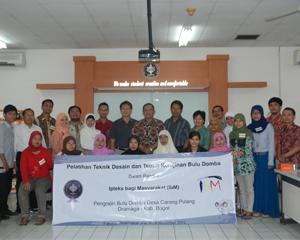Cooperation of Fapet-IPB and STT Textile of Bandung: What and How?

How can Faculty of Animal Husbandry (Fapet) of IPB work together with the Technological College of Textile (STT) of Bandung? Livestock and Textiles? Are these relevant? Yes. Our local sheep in particular those resulted from crossbreeding can produce wool with different levels of quality, refinement and strength. The wool of Indonesian local sheep is not used to produce materials of textile, garment or clothing because it is relatively coarse.
The fur of local sheep can be processed into yarn and woven handcrafts in the form of wall hangings, table cloth, food mat, pillow, dolls, and so on. The wool processing has long been developed in Fapet by Dr. M. Yamin and his team since 1994, involving some communities, but this has not progressed continuously because of some obstacles. Nevertheless, this activity has been incorporated into the course or study material on processing animal by-products of sheep wool for further studies and development.
Through the IBM program (science and technology for the Community) of 2012, the Higher Education via LPPM IPB, this time is doing new strategies in developing this sheep wool: (i) Institutional cooperation with STT Textile of Bandung in the development of technology, (2) training on textile design and weaving by STT, and (3) application of village wool business. The development cooperation between both organizations represented by Dean of Fapet IPB and Chairperson of STT will be carried out in the near future.
The three-day training from 6 – 8 November 2012 was opened by the Dean of Fapet IPB, Dr.Luki Abdullah, attended by the Head and Secretary of Department of Livestock Production and Technology of (IPTP) represented by Dr. Afton, Dr. Sri Darwati, Dr.Jakaria, Head of THT Division Dr. Rarah, Head of Animal Meat Production, Work and Various Livestock Dr. Asnath, 13 participants from Carang Pulang Villageas as the main major partner, Situ Daun and Ciherang Tengah as well as students and lecturers. The training instructors are those directly from STT Textile of Bandung, Ahmad Ibrahim Makki, MT and Nandang Setiawan ST, coordinated by the Head of LPM STT Textile, Sajinu, STeks, MT.
This training will be followed by a business implementation in partnership, in which Fapet-IPB will produce wool of local sheep, lend materials and tools, and market the products; while the village handcrafters will produce woven wool based on the product design already set up and they will certainly get income from the resulted the handicraft products. The advantage of this cooperation system is that craftsmen can perform the such an activity in the home, so they can do other chores.
Dean is institutionally supporting, very enthusiastic and advises that the team (Dr. Yamin, Nenny SU, Baihaqi, MSc, Resta MSc and Devi SPT.) assisted by the related Sections and Department to continue to develop the technology and business that is very unique with a high selling value, in both the College and in the community, especially the villages around IPB campus. "If the wool craft business is advancing, so will the national breeding of sheep and prosperous the Indonesian people. Ameen," Dr. Yamin hopes. (Mtd)



